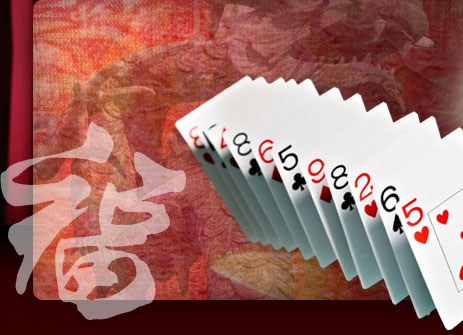Chuo Dai Di Variations
Chuo Dai Di is an exciting four-player Chinese card shedding game. It uses a standard 52-card deck and its poker-like game play and numerous variations help spread the game's popularity.
In the west, Chuo Dai Di is called "Big Two". In Mandarin, it is known as "Da Lao Er". In Taiwan it is named "Bu Bu Gao Sheng". And in the Philippines, it is called "Pusoy Dos".
Before we get into the different variations of Chuo Dai Di, let's get to know the game first.
Chuo Dai Di Game Play
The object of Chuo Dai Di is to be the first player to play all of his cards on the table, or to have as little cards as possible when another player finishes.
Each player is dealt 13 cards each. The cards can be played individually, in pairs or in five-card combinations.
The player who has the three of diamonds begins and must play this card (place it at the center of the table), either by itself, in a pair or as part of a legal five-card combination. The player to his right plays next, and so on round the table.
The next player must beat the previous player's cards by placing a higher card, a better pair or a superior five-card combination, depending on the number of cards played by the previous player on the center of the table.
Alternatively, players have the option to pass (play no cards) if they don't have the cards that can beat the previous player's hand. Players can also pass as part of their strategy.
This may continue for several turns, until someone gets rid of all of his cards. The first player who plays all the cards in their hand wins, the round ends, and the remaining cards of the other players are counted and scored.
If a player has nine cards or less, each of the cards is counted as two points. If a player is left with anywhere from 10 - 13 cards, three points per card is counted. When all the points the points are tallied, the player with the most points usually get a penalty or pays more to the winning player.
Chuo Dai Di Variations
Here are just some of the many variations of Chuo Dai Di depending on the country you're in.
Direction of Play - probably the most noticeable variation of Chuo Dai Di is the direction of play. In the west, just like any other card game, Chuo Dai Di is played to the left of the dealer. In the east, the game is played to the right of the dealer. Some even play the game in alternate directions - one round to the left, the next round to the right.
Dealing and starting play - some forego the procedure of selecting who gets to receive the first card. The dealer simply deals the card to the player to his left or right, depending on the direction of play.
No Triples and Flushes - in Singapore and Taiwan, some people play without triples and flushes.
Quads without a kicker - some allow a four of a kind to be played by itself withour the fifth card or kicker.
Honor hands beat all other hands - in Lukang, Taiwan, honor hands (four of a kind and straight flush) beat all other hands and can be played to beat single cards, pairs and triples.
Seven-card Straight Flush - in some cases, a straight flush is played with two extra cards, making a seven card combination. A four of a kind plus a card or a straight flush plus two cards can be played to beat any single card or other combination. A four of a kind plus a card can only be beaten by a higher four plus a card or a straight flush plus two, and a straight flush plus two is only beatemn by a higher straight flush plus two.
Dragon wins - in Hong Kong, some play that a player who is dealt a dragon, which is one card of each rank: A-2-3-4-5-6-7-8-9-10-J-Q-K, immediately wins the game. Each of the other players scores as though they lost without playing any cards (39 penalty points).
Last Card Announcement - in some cases, players are required to announce that he only has one card left. Some require that if you are playing immediately before a player who has only one card you must play your highest single card or a combination of more than one card. (This could be against your interests - you might otherwise wish to help the player after you to win, so as to catch another player with a large number of cards.)
Playing until only one player has cards - some do not end the play when one player runs out of cards. Instead the others continue to play, dropping out as they run out of cards, until only one player remains. If a player's last card (or combination) is not beaten by any other player, the turn to start again with any legal play passes to the next player in turn after the one who has just finished.
域名 ChuoDaiDi.net 正在出售中,如果您对该域名感兴趣,请点击这里提供您的报价。
The domain name ChuoDaiDi.net maybe for sale. Please click here if you would like to make an offer.


